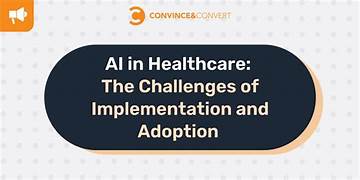What Are the Challenges of Implementing AI in Healthcare?
Artificial Intelligence (AI) has emerged as a transformative force in healthcare, offering promising solutions to enhance diagnostics, optimize treatment plans, and streamline administrative tasks. Despite its potential, implementing AI in healthcare is fraught with challenges that span technical, ethical, and operational dimensions. This article delves into the key obstacles associated with integrating AI into healthcare systems and explores strategies to address them.
Technical Challenges
1. Data Quality and Availability
AI systems rely on large datasets to train algorithms effectively. However, healthcare data often suffers from issues such as:
- Incomplete Records: Missing or inconsistent data can skew AI predictions.
- Heterogeneity: Data formats, terminologies, and standards vary widely across institutions.
- Bias: Historical data may reflect biases in care delivery, leading to inequitable AI outcomes.
2. Interoperability
Healthcare systems are often siloed, with disparate Electronic Health Record (EHR) platforms and legacy systems that struggle to communicate with each other. This lack of interoperability hampers the seamless integration of AI tools.
3. Algorithm Generalization
AI models trained on specific datasets may not perform well when applied to diverse patient populations. For example, an AI system trained in one region may fail to account for genetic, environmental, or cultural differences in another.
4. Scalability and Computational Power
Implementing AI solutions at scale requires significant computational resources, especially for real-time applications like imaging analysis or predictive analytics. Many healthcare institutions lack the infrastructure to support such demands.
Ethical and Legal Challenges
1. Patient Privacy and Data Security
AI systems process sensitive patient data, raising concerns about:
- Data Breaches: Unauthorized access to AI systems could expose confidential information.
- Consent: Patients may not fully understand how their data is used in AI training.
- Compliance: Meeting regulatory requirements like HIPAA or GDPR is complex when dealing with AI.
2. Bias and Fairness
AI algorithms can perpetuate or amplify existing biases in healthcare. For example:
- Demographic Disparities: AI might perform less effectively for underrepresented groups.
- Access Inequities: Resource-limited settings may lack the means to adopt AI, widening care gaps.
3. Ethical Decision-Making
AI’s role in clinical decision-making raises ethical questions, such as:
- Who is responsible if an AI system’s recommendation leads to adverse outcomes?
- How should clinicians balance AI insights with their own expertise and patient preferences?
4. Transparency and Explainability
Many AI systems function as “black boxes,” offering little insight into how they arrive at decisions. This lack of transparency can:
- Undermine trust among healthcare professionals and patients.
- Make it difficult to identify and rectify errors in AI predictions.
Operational Challenges
1. Integration into Clinical Workflows
AI tools must fit seamlessly into existing workflows to gain acceptance among healthcare professionals. Challenges include:
- Resistance to change from clinicians accustomed to traditional practices.
- Additional training requirements to use AI systems effectively.
2. Cost of Implementation
Developing, deploying, and maintaining AI solutions is expensive. Smaller healthcare providers, particularly in resource-constrained settings, may find these costs prohibitive.
3. Regulatory Hurdles
AI in healthcare is subject to stringent regulations to ensure safety and efficacy. Navigating the regulatory landscape can be time-consuming and costly, slowing down innovation.
4. Validation and Testing
Healthcare AI must undergo rigorous validation to ensure accuracy and reliability. This process is complex, as it requires:
- Longitudinal studies to assess real-world effectiveness.
- Collaboration across multiple stakeholders, including researchers, clinicians, and policymakers.
Cultural and Organizational Challenges
1. Lack of Trust Among Stakeholders
Building trust in AI systems is crucial for widespread adoption. Skepticism arises from:
- Fear of job displacement among healthcare workers.
- Concerns over AI’s reliability and potential to make errors.
2. Education and Training Gaps
Many healthcare professionals lack the training to understand and leverage AI effectively. Bridging this gap requires:
- Educational programs focused on AI fundamentals.
- Ongoing support to help clinicians integrate AI into practice.
3. Leadership and Strategy
Successful AI implementation demands strong leadership and a clear strategy. Organizations often struggle with:
- Aligning AI initiatives with broader healthcare goals.
- Ensuring cross-departmental collaboration to break down silos.
Addressing the Challenges
1. Improving Data Quality and Accessibility
- Standardize data collection and storage practices to enhance consistency.
- Promote data sharing through secure platforms to enable diverse AI training.
2. Enhancing Interoperability
- Adopt universal standards for EHR systems to facilitate data exchange.
- Invest in middleware solutions that bridge gaps between disparate systems.
3. Promoting Ethical AI Development
- Conduct bias audits to identify and mitigate disparities in AI systems.
- Develop frameworks to ensure AI aligns with ethical principles and societal values.
4. Ensuring Transparency and Explainability
- Encourage the use of interpretable AI models where possible.
- Provide clear documentation and visualizations to explain AI decisions to end-users.
5. Building Workforce Competence
- Incorporate AI training into medical education curricula.
- Offer continuous professional development programs focused on digital skills.
6. Securing Funding and Support
- Advocate for government grants and private investments to support AI initiatives.
- Develop cost-effective AI solutions tailored to the needs of smaller healthcare providers.
7. Streamlining Regulatory Processes
- Engage with regulators early in the development process to ensure compliance.
- Collaborate internationally to harmonize AI regulations across borders.
The Road Ahead
While the challenges of implementing AI in healthcare are substantial, they are not insurmountable. Overcoming these obstacles requires a collaborative approach involving healthcare providers, technologists, policymakers, and patients. By addressing technical, ethical, and operational challenges, the healthcare industry can harness AI’s full potential to improve patient outcomes, reduce costs, and enhance overall efficiency.
In the coming years, advancements in AI technologies, combined with robust policies and workforce development, will pave the way for a more AI-integrated healthcare ecosystem. As stakeholders navigate this transformative journey, the focus must remain on ensuring that AI serves as a tool for equitable, ethical, and effective healthcare delivery.


